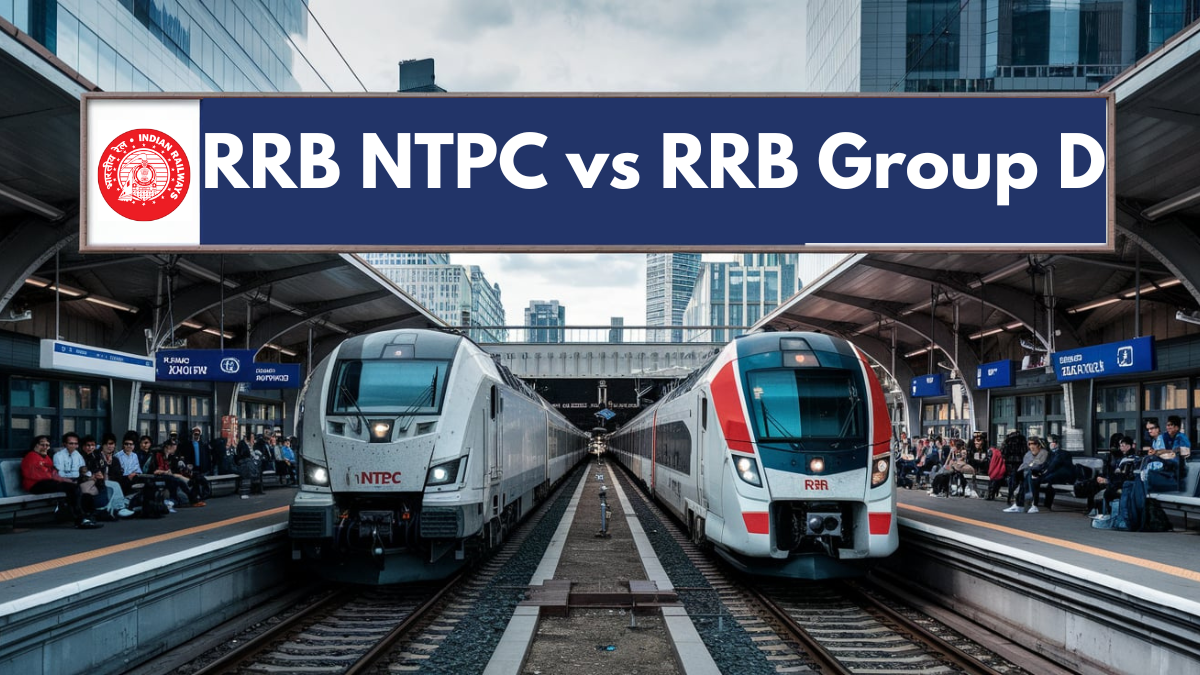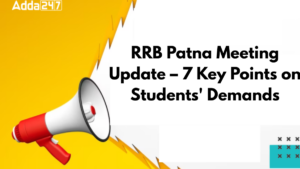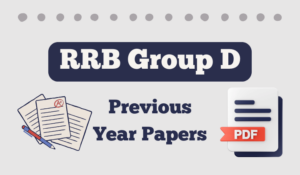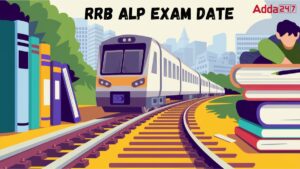Table of Contents
The Indian Railways is one of the largest employers in the country, and the Railway Recruitment Board (RRB) conducts exams for various posts, including RRB NTPC (Non-Technical Popular Categories) and RRB Group D. While both these exams offer job opportunities in the Indian Railways, they cater to different roles and have distinct eligibility criteria, selection processes, and job profiles. Here’s a detailed comparison to help candidates understand the differences between RRB NTPC vs RRB Group D.
RRB NTPC vs RRB Group D
RRB NTPC consists of non-technical roles that primarily involve clerical, supervisory, and administrative tasks, while RRB Group D jobs include technical and maintenance-related work, such as roles like Electrician, Track Maintainer, Fitter, and many others. For more information about the different job roles in RRB NTPC and RRB Group D, refer to the table below:
| Parameter | RRB NTPC | RRB Group D |
|---|---|---|
| Full Form | Non-Technical Popular Categories | Railway Group D |
| Job Level | Clerical, Supervisor and Manager positions | Entry-level positions |
| Number of Posts | Various posts like Clerk, Station Master, Train Manager, Ticket Supervisor and more | Various positions like Track Maintainer, Electrician, fitter, Helper, Pointsman and More |
| Exam Conducting Body | Railway Recruitment Board | Railway Recruitment Board (RRB) |
RRB NTPC vs RRB Group D Eligibility Criteria
Eligibility criteria for RRB NTPC and RRB Group D, highlight the differences in educational qualifications and age limits. Understanding these criteria is essential for candidates to determine their eligibility for each role
Educational Qualification
As the job roles differ significantly between RRB NTPC and RRB Group D, the educational criteria also vary. RRB Group D is a Level 1 job, which requires only a 10th-grade qualification and an ITI certificate from a recognized institution and RRB NTPC jobs range from Level 2 to Level 6, with some posts requiring a 12th pass qualification and for other posts need a graduation degree.
| Parameter | RRB NTPC | RRB Group D |
|---|---|---|
| Minimum Qualification | 12th Pass for certain posts, Graduation for others | 10th Pass or ITI from institutions recognized by NCVT/SCVT |
| Specific Requirements | Some posts may require typing skills (Clerk, Typist) | No additional qualifications are required |
Age Limit
Age limit is the crucial factor while applying candidates must refer to the age criteria before applying as the age limit is different for both the jobs
| Parameter | RRB NTPC | RRB Group D |
|---|---|---|
| Age Criteria | 18-30 years for Under-Graduate posts | 18-33 years |
| 18-33 years for Graduate posts | ||
| Age Relaxation | Applicable for reserved categories | Applicable for reserved categories |
RRB NTPC vs RRB Group D Examination Pattern
The exam patterns for RRB NTPC and RRB Group D differ significantly. The RRB NTPC exam consists of two computer-based tests, CBT 1 and CBT 2, followed by a skill test. However, in Group D, there is only a computer-based test followed by a Physical Efficiency Test.
RRB NTPC Exam Pattern
Stage 1: Computer-Based Test (CBT 1)
- Subjects: General Awareness, Mathematics, General Intelligence & Reasoning
- Total Questions: 100
- Duration: 90 minutes
- Negative Marking: 0.33 marks for each incorrect answer
Stage 2: Computer-Based Test (CBT 2)
- Subjects: General Awareness, Mathematics, General Intelligence & Reasoning
- Total Questions: 120
- Duration: 90 minutes
- Negative Marking: 0.33 marks for each incorrect answer
Stage 3: Skill Test (if applicable)
- Typing Skill Test for certain posts like Junior Clerk and Senior Clerk
- Computer-Based Aptitude Test for Station Master
Stage 4: Document Verification and Medical Examination
RRB Group D Exam Pattern
Stage 1: Computer-Based Test (CBT)
- Subjects: General Science, Mathematics, General Intelligence & Reasoning, General Awareness & Current Affairs
- Total Questions: 100
- Duration: 90 minutes
- Negative Marking: 0.33 marks for each incorrect answer
Stage 2: Physical Efficiency Test (PET)
- Male and female candidates have different physical tasks to complete, such as running, lifting weights, etc.
Stage 3: Document Verification and Medical Examination
RRB NTPC vs RRB Group D Job Profiles
RRB NTPC positions typically involve clerical and supervisory duties, such as ticketing, accounts, and office administration, while Group D roles are more technical and maintenance-oriented, involving tasks like track maintenance, porters, and assistant pointsman.
RRB NTPC Job Profiles
The job profiles for various post of RRB NTPC like Station Master, Trains Clerk, Train Manager, Junior Clerk cum Typist, Commercial cum Ticket Clerk and many other is tabulated below
| Post | Job Role Description |
|---|---|
| Junior Clerk cum Typist | Performs clerical duties such as record maintenance, file management, and assisting with general office tasks. |
| Accounts Clerk cum Typist | Maintains financial records, processes payments, and handles basic accounting functions. |
| Commercial cum Ticket Clerk | Engages in ticket sales, customer service, and helps passengers with reservations and inquiries. |
| Trains Clerk | Check the ticket of passengers in train and any other requirement of problems raised by the passengers |
| Chief Commercial cum Ticket Supervisor | Supervises ticketing operations, oversees staff, and ensures efficient handling of passenger services. |
| Station Master | Manages the overall functioning of the railway station, including train schedules, smooth operations, and addressing passenger queries. |
| Goods Train Manager | Ensures safe and timely cargo transport by rail, supervises loading and unloading, and manages freight operations. |
| Senior Clerk cum Typist | Handles senior-level clerical work, including data entry, record management, and administrative tasks. |
| Junior Accountant Assistant cum Typist | Assists with accounting tasks, financial data management, and typing work related to financial records. |
RRB Group D Job Profiles
The job profiles of some Group D posts are summarized in the table below, allowing candidates to review the responsibilities associated with these roles.
| Post | Job Role Description |
|---|---|
| Track Maintainer | Maintaining railway tracks, inspecting track conditions |
| Helper/Assistant | Assisting technicians in various departments |
| Gateman | Managing the operation of level crossing gates |
| Pointsman | Assisting in switching railway tracks |
| Assistant Loco Shed | Manages electrical maintenance of locomotives |
| Assistant C&W (Carriage and Wagon) | Handles carriage and wagon maintenance |
| Assistant Loco Shed (Diesel) | Manages diesel locomotive maintenance |
| Assistant Signal & Telecom | Maintaining and Repair signal and telecommunication systems |
RRB NTPC vs RRB Group D Salary and Benefits
The salary associated with these roles varies according to the pay level. Group D positions are classified as pay level 1 jobs, while RRB NTPC roles range from pay level 2 to pay level 6, resulting in higher salaries compared to Group D. The detailed salary breakdown is provided below.
| Parameter | RRB NTPC | RRB Group D |
|---|---|---|
| Basic Pay (Entry Level) | ₹19,900 to ₹35,400 per month (Level 2-6) | ₹18,000 per month (Level 1) |
| Grade Pay | ₹2,800 to ₹4,200 | ₹1,800 |
| Total Salary (with allowances) | ₹30,000 to ₹45,000 | ₹22,000 to ₹25,000 |
RRB NTPC vs RRB Group D Additional Benefits
Both RRB NTPC and RRB Group D are central government jobs, ensuring job security for employees. Both the jobs provide various allowances and benefits, and the opportunities for promotion in both roles are outlined in the table below.
| Parameter | RRB NTPC | RRB Group D |
|---|---|---|
| Allowances | House Rent Allowance, Dearness Allowance, Travel | House Rent Allowance, Dearness Allowance |
| Promotion Opportunities | More frequent, can reach higher administrative levels | Fewer opportunities, limited to technical promotions |
| Job Stability | Both positions offer good job security | Both positions offer good job security |
| Transfer Policies | Transfers may be more frequent, depending on the post | Transfers are less frequent for Group D posts |
RRB NTPC vs RRB Group D Career Growth and Promotion
As both are central government jobs, they offer stable career growth and timely promotion opportunities. However, RRB NTPC typically provides faster promotions compared to RRB Group D profiles. Promotions in NTPC will vary according to the specific post, while in Group D technical roles, promotions can lead up to the position of Junior Engineer.
RRB NTPC vs RRB Group D Key Differences
RRB NTPC focuses on clerical and supervisory roles with moderately difficult exams, requiring skills like typing and computer proficiency. In contrast, RRB Group D involves technical and maintenance jobs with relatively easier exams emphasizing physical endurance. NTPC offers better growth opportunities towards administrative roles, while Group D provides promotions to senior technical posts. For more details, refer to the table below.
| Feature | RRB NTPC | RRB Group D |
|---|---|---|
| Type of Job | Clerical and supervisory roles | Technical and maintenance roles |
| Exam Difficulty | Moderately difficult, with more subjects covered | Relatively easier, with basic subjects |
| Skills Required | Typing skills, computer proficiency (for some posts) | Physical endurance for PET |
| Growth Opportunities | Higher chances of promotions to administrative roles | More technical in nature, with fewer administrative positions |
Which Exam Should You Choose?
Above, we have discussed the perks and benefits of both RRB NTPC and RRB Group D jobs. Ultimately, the choice depends on the candidates’ preferences and career goals. However, it’s important to remember that eligibility criteria must be met in order to apply for these roles.
- RRB NTPC: Ideal for candidates who have completed at least 12th grade or graduation and are looking for clerical, supervisory, or managerial positions with opportunities for career growth.
- RRB Group D: Suitable for candidates with basic educational qualifications (10th pass or ITI) who prefer hands-on technical work and are comfortable with physical tasks.
Conclusion
Both RRB NTPC and RRB Group D provide stable career options in the Indian Railways, but the choice between them depends on the candidate’s educational qualifications, career aspirations, and job preferences. While RRB NTPC offers more growth opportunities and higher pay, RRB Group D is more accessible and suitable for those who prefer technical and maintenance work.




 RRB Patna Meeting Update – 7 Key Points ...
RRB Patna Meeting Update – 7 Key Points ...
 RRB Group D Previous Year Papers, Downlo...
RRB Group D Previous Year Papers, Downlo...
 RRB ALP CBT 2 Revised Exam Date 2025 Out...
RRB ALP CBT 2 Revised Exam Date 2025 Out...


